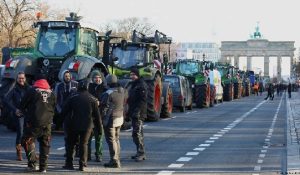16-01-2024
BERLIN: Far-right groups have discussed toppling the German government as they seek to harness the anger of ongoing farmer protests over subsidy cuts.
 A protest took place in Berlin on Monday amid fears extremists are infiltrating the agricultural movement.
A protest took place in Berlin on Monday amid fears extremists are infiltrating the agricultural movement.
A team has been working with a media outlet verify to build up a picture both online and on the ground.
While the far right is piggybacking on the row, a “Germany first” narrative appears to be gaining wider traction.
As farmers blockade roads over planned subsidy cuts, there have been numerous reports of neo-Nazi or monarchist groups turning up at rallies.
Telegram channels reveal fervent posts about hopes of an emerging mass resistance that could help “dismantle” the government.
Small, fringe far-right groups such as the Free Saxons, The Third Way and The Homeland, have a very varied number of online followers but Chancellor Olaf Scholz warned this weekend that extremists were using social media to “poison” democratic debate as he described any talk of uprisings as dangerous “nonsense”.
A media team has been to five demonstrations in the past week and monitored several more.
While many farmers and Germany’s main agricultural union are eager to distance themselves from extremism, far-right imagery continues to appear.
 In the eastern city of Cottbus, we saw a man being sent away from an official protest for allegedly wearing a symbol of the Reichsburger; a disparate far right movement that rejects the modern German state.
In the eastern city of Cottbus, we saw a man being sent away from an official protest for allegedly wearing a symbol of the Reichsburger; a disparate far right movement that rejects the modern German state.
A senior organizer of the Cottbus demo told media they learned later that known far-right figures had remained within the hundreds-strong crowd, which was made up of a cross-section of people well beyond the farming community.
There are also examples of a flag, known as the Landvolkbewegung, linked to an anti-Semitic agricultural movement from the 1920s.
The vast majority of banners we saw do not carry overt far-right messaging but instead centre on anger at the treatment of farmers.
Unions are demanding ministers reverse plans to phase out fuel subsidies that can be worth up to €3,000 ($3,300; £2,600) a year for an average business.
Farmers are also speaking of much longer-standing grievances about “burdensome” rules and regulations but strikingly often, both farmers and others who attend these demos have told us they feel too much money is being sent abroad, a common refrain of the far-right.
Supporting countries like Ukraine may be the correct thing to do says Silvio, a farmworker in the eastern state of Brandenburg; “but… we can’t spend everything and nothing is left for the home country, for the farmers.” (Int’l News Desk)
 Pressmediaofindia
Pressmediaofindia




